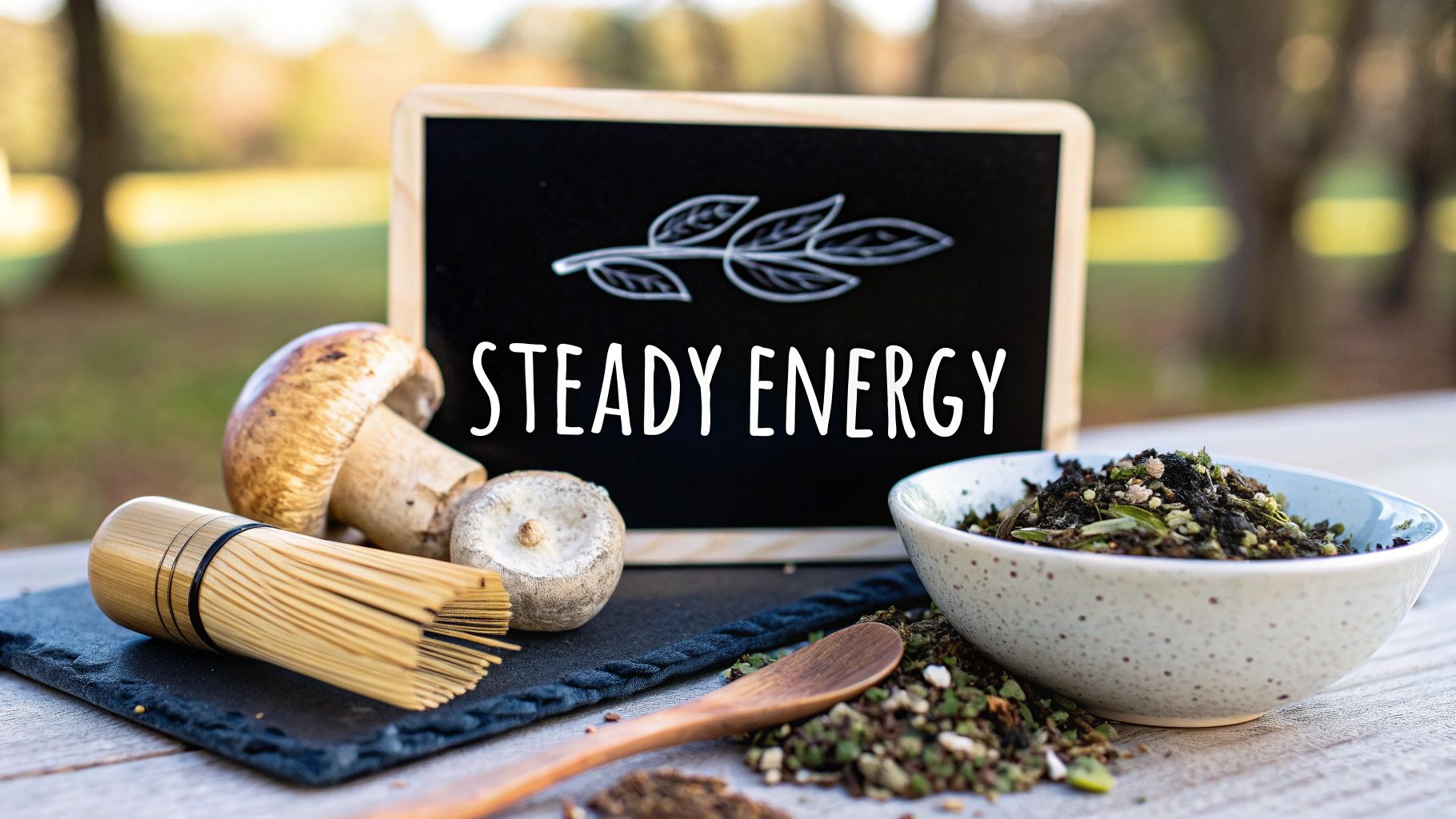If you've ever felt stuck on the coffee rollercoaster – that exhilarating morning high followed by a crushing afternoon slump – you’re not alone. Many of us are looking for caffeine alternatives for energy precisely to escape those familiar jitters and crashes. The best alternatives offer a smoother, more sustained lift without the unwanted baggage.
Why People Are Trading Their Coffee for Calmer Alternatives
That morning cup of coffee is a deeply ingrained ritual for millions, promising a sharp jolt of alertness to get the day started. But for a growing number of us, that promise comes with a downside that’s getting harder to ignore. The initial energy spike too often dissolves into a frustrating pattern of anxiety, digestive upset, and poor sleep.
Think of it like this: your daily coffee is a high-interest loan on your energy. It feels great upfront, but you always have to pay it back later, often leaving you more drained than when you started. This constant cycle of borrowing and crashing is exactly why so many are now seeking a more stable and reliable way to feel energised.
The Trouble with the Spike-and-Crash Cycle
The most common complaints about traditional caffeinated drinks aren't just minor annoyances; they can seriously disrupt your well-being throughout the day.
- Jitters and Anxiety: That rapid adrenaline surge can easily tip over from productive energy into nervous tension, making it difficult to focus.
- The Afternoon Slump: The infamous 3 PM wall is no myth. It's the direct result of the initial caffeine hit wearing off, leaving you with fatigue and brain fog.
- Digestive Discomfort: Coffee is highly acidic, which can be harsh on the stomach lining and cause problems for many people.
- Poor Sleep Quality: Caffeine can linger in your system for hours. Even a cup at lunchtime can interfere with your ability to get the deep, restorative sleep you need.
Choosing between your usual coffee and a calmer alternative often comes down to how these effects impact your life. For a deeper look at this, our detailed comparison of matcha vs coffee as an energy source breaks it down even further.
This shift isn't just about dodging negative side effects. It's a proactive move towards a more balanced and health-conscious way of living. It's about finding an energy source that works with your body, not against it.
This move towards wellness is a powerful cultural trend. In the UK, the market for products offering energy without traditional caffeine is poised for significant growth, reflecting a clear change in what consumers want. People are actively seeking options that provide sustainable energy, driven by health concerns and a desire to avoid jitters and dependency. Industry forecasts show this market growing steadily through 2031. You can read the full research on the UK caffeine substitute market here.
To really see the difference, it helps to put the experiences side-by-side.
The Energy Experience Coffee vs Alternatives
| Energy Characteristic | Traditional Coffee or Energy Drinks | Caffeine Alternatives (e.g., Matcha) |
|---|---|---|
| Onset of Energy | Fast and intense spike | Gradual, smooth onset |
| Duration | Short-lived, often 1-3 hours | Sustained, often 4-6 hours |
| The "Come-Down" | Abrupt crash, fatigue, brain fog | Gentle tapering, no crash |
| Mental State | Can cause jitters, anxiety, scattered focus | Promotes calm alertness, enhanced focus |
| Physical Feeling | Potential for heart palpitations, digestive upset | Gentle on the body, minimal side effects |
This table paints a clear picture: while coffee delivers a quick, powerful hit, alternatives are designed for a marathon, not a sprint. They provide the steady, reliable energy needed for lasting focus and productivity.
The Science of Sustained Energy Without the Crash
To really get why so many of us are looking for better ways to stay energised, we need to first look at what our daily coffee is actually doing inside our bodies. When you sip a coffee, the caffeine hits your bloodstream fast. It gets to work blocking adenosine, the very chemical in your brain that signals tiredness, while at the same time giving you a shot of adrenaline. This is what creates that familiar, powerful jolt of alertness.
But that rapid surge doesn’t last. Think of it like a steep, rocky climb followed by a sheer drop. Once the caffeine's effects fade, your body can feel even more drained than before. This is the dreaded "caffeine crash" that has so many of us reaching for another cup just to get through the afternoon.
L-theanine: The Secret to Calm Alertness
This is where matcha completely changes the game. Unlike coffee, matcha contains a fantastic amino acid called L-theanine. This special compound works in perfect harmony with the caffeine in the tea to foster a state of calm, focused alertness. It encourages the production of alpha brain waves, which are linked to a feeling of relaxed clarity, but without making you feel sleepy.
Imagine the difference between a bumpy, stop-and-start B-road and a smooth, steady motorway. The energy from coffee is like that B-road—full of sharp turns and sudden stops. Matcha, on the other hand, gives you that smooth motorway journey, thanks to L-theanine. It helps you get where you're going feeling energised and composed, not frazzled.
L-theanine essentially smooths out the sharp edges of caffeine. It slows down how quickly your body absorbs the caffeine, which prevents that sudden spike and the inevitable crash. The result is a much longer, more stable plateau of energy that can last for 4-6 hours.
For anyone weighing up their options, understanding the different ways these drinks work is key. If you're curious about a side-by-side comparison, you can learn more about how matcha and coffee affect clean energy and focus in our detailed guide.
This image shows some of the natural boosters that help provide this kind of sustained energy.
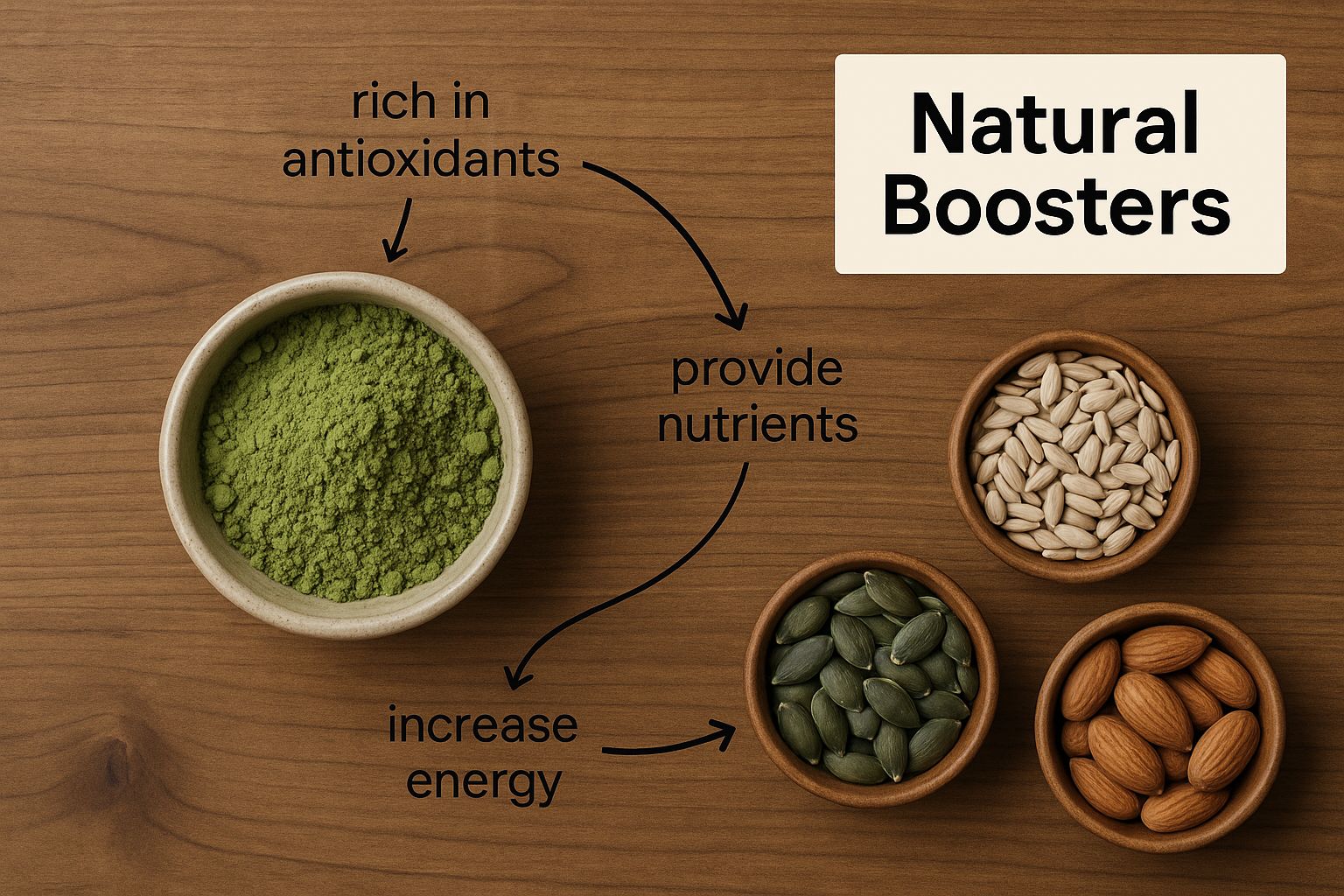
As you can see, natural ingredients like matcha powder, seeds, and nuts work together to provide a more holistic and balanced boost. It's about moving beyond simple stimulation to something more supportive.
Adaptogens: The Body's Stress Thermostat
Beyond the wonders of L-theanine, there's another class of powerful ingredients changing how we think about energy: adaptogens. Found in functional blends like Amatsu Shrooms, adaptogens are remarkable plants and mushrooms that help your body better handle and adapt to all kinds of stressors—whether physical, chemical, or biological.
Picture an adaptogen as a smart thermostat for your body's stress response. When your stress levels creep too high, adaptogens help bring them back down. If you're feeling exhausted, they can provide a gentle, natural lift. Instead of forcing your body into a state of high alert like caffeine does, they help it find its natural balance, or homeostasis. This regulation is vital for avoiding burnout and building genuine, long-term resilience, offering a much smarter way to manage your daily energy.
Your Guide to the Best Caffeine Alternatives for Energy
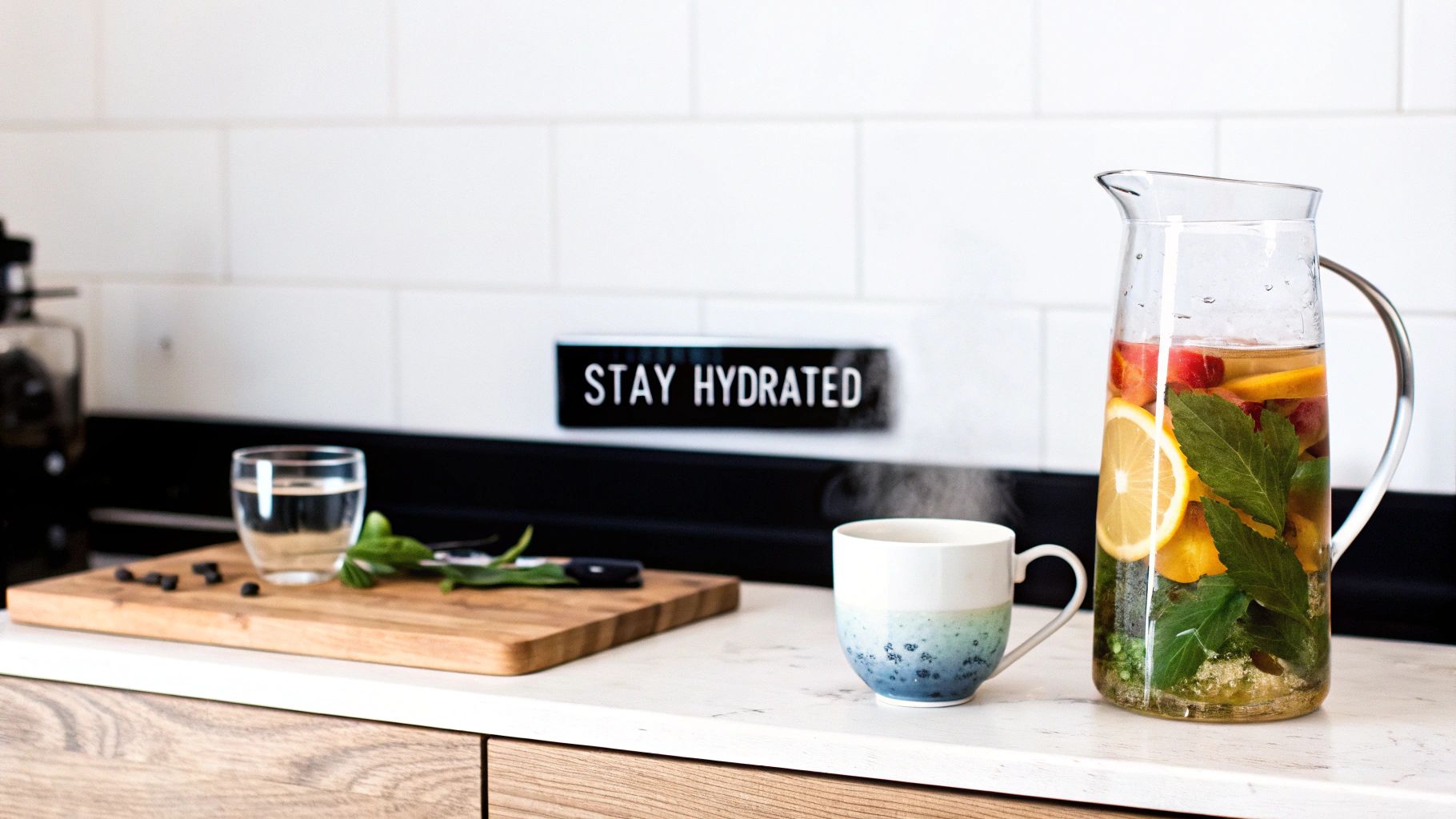
Now that we’ve covered the science behind getting a better kind of buzz, it’s time to look at the practical side of things. Finding the right caffeine alternatives for energy is all about matching an option to your lifestyle, taste, and what you’re hoping to achieve. There's a whole world of choices beyond the usual coffee pot, from earthy teas to surprisingly powerful fungi.
This guide will walk you through some of the most effective and popular alternatives out there, helping you pinpoint the perfect fit for your daily ritual. We'll start with what many consider the undisputed champion of calm alertness: matcha.
Matcha: The Gold Standard for Focused Energy
Matcha isn't just another green tea; it’s really in a class of its own. It's made from finely ground, shade-grown tea leaves, which means you’re consuming the entire leaf. This delivers a much more potent blend of nutrients than you'd get from simply brewing and discarding the leaves.
Its real magic lies in the unique partnership between its natural caffeine and an amino acid called L-theanine. This combination creates a state of relaxed focus that’s almost impossible to get from coffee. Instead of a jarring spike followed by a crash, you get a gentle, sustained lift that can last for hours. It’s perfect for productive work sessions or tapping into your creativity. To really grasp what makes it so special, see why Amatsu Matcha stands out in the UK functional wellness scene.
- Who It’s For: Professionals, students, or anyone who needs long-lasting mental clarity without the jitters.
- What It Tastes Like: High-quality matcha, like Amatsu's Pure Ceremonial Matcha, has a smooth, rich, and slightly sweet flavour with a distinct umami depth. No bitterness here.
- How It Feels: Think of it as a calm, clear-headed wave of energy that sharpens your focus and elevates your mood.
Adaptogenic Mushrooms: The Resilience Builders
Adaptogenic mushrooms are another fantastic category of caffeine alternatives for energy, but they work in a completely different way. Instead of giving you a direct jolt of stimulation, they help your body build resilience to stress—a primary culprit behind modern fatigue.
Think of them as your body's personal support system. By helping to regulate your stress response, they conserve your natural energy reserves and help prevent burnout before it even starts. Functional blends like Amatsu Shrooms Matcha brilliantly combine the benefits of matcha with powerful adaptogens like Lion’s Mane and Cordyceps to support both brain function and physical stamina.
Adaptogens don't just give you energy; they help your body manage its own energy more efficiently. This creates a more stable foundation for long-term vitality and well-being.
Other Popular Caffeine-Free Choices
While matcha and adaptogens are premier choices, other plant-based options have become popular for their unique benefits and flavours. These are especially good for anyone looking to cut out caffeine completely.
A rising trend in the UK shows a clear shift toward organic, plant-based coffee substitutes. Alternatives often featuring ingredients like chicory root are gaining ground because of their natural properties and lower risk of caffeine-related side effects. They really appeal to people who are sensitive to caffeine or simply want to reduce their intake.
Here’s a quick look at two popular options:
| Alternative | Flavour Profile | Primary Benefit |
|---|---|---|
| Yerba Mate | Earthy, slightly bitter, and robust. Often described as a cross between green tea and coffee. | Contains a moderate amount of caffeine but is also packed with antioxidants. It’s known for a clean energy boost that many find less agitating than coffee. |
| Chicory Root | Bold, roasted, and nutty with a slightly bitter note, making it a convincing coffee stand-in. | It's naturally caffeine-free and rich in inulin, a prebiotic fibre that supports gut health. It gives you that rich, coffee-like ritual without any stimulants. |
Ultimately, choosing the right alternative is a personal journey. Whether you need the focused calm of matcha, the stress-balancing power of adaptogens, or a completely caffeine-free ritual, the perfect option is out there waiting to transform your day.
How to Make a Smooth Switch From Coffee
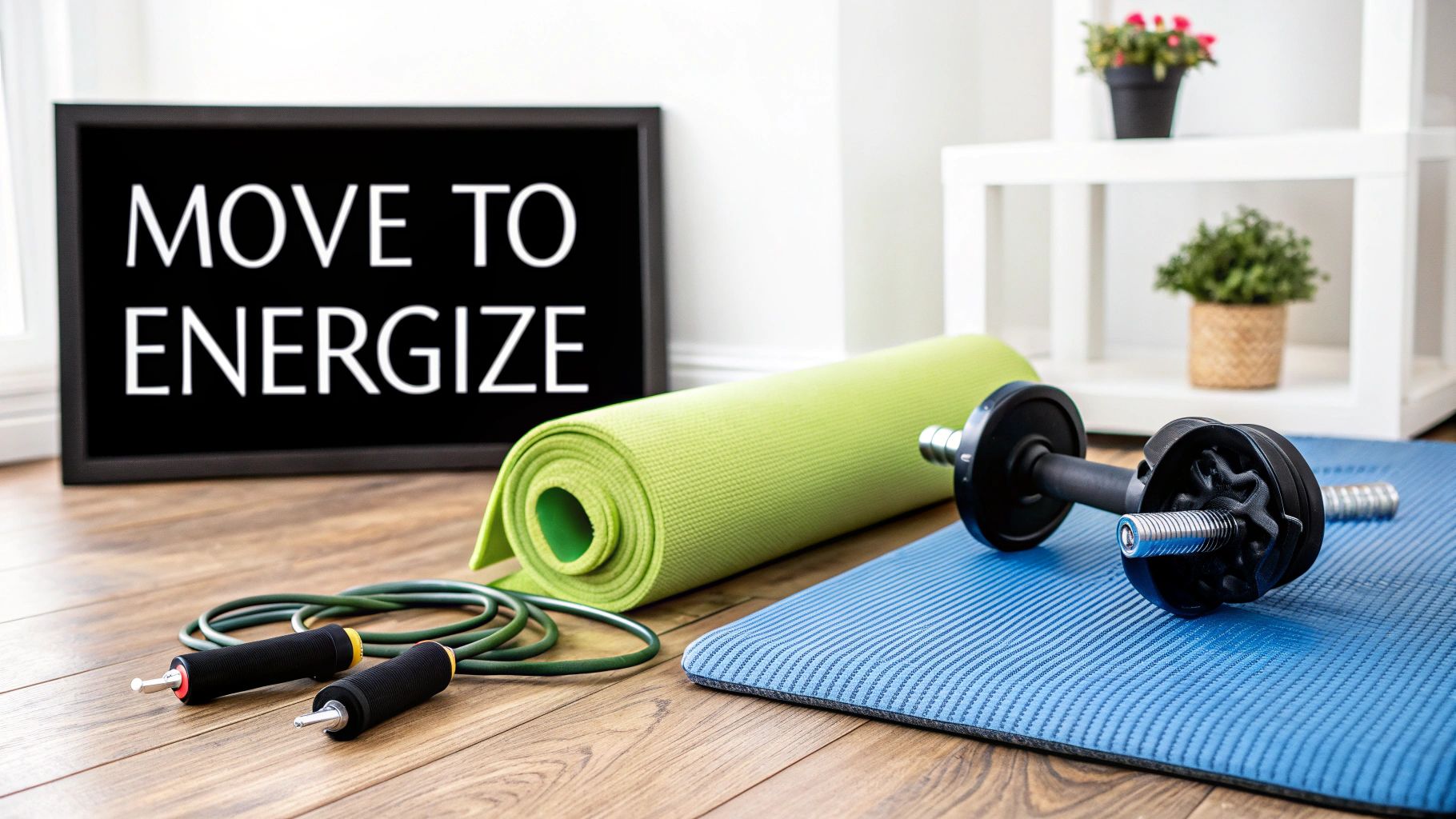
Moving away from your daily coffee can feel daunting. Let's be honest, the thought of giving up that morning energy boost is enough to make anyone hesitate. But what if you could switch to a healthier alternative without the dreaded headaches or afternoon slumps? The good news is you can.
With a simple, gradual approach, you can ease into a new routine and discover a more sustainable source of vitality. The secret is to avoid going "cold turkey," which can shock your system and lead to withdrawal. Instead, we’ll gently introduce your body to something new, making the change feel like a positive upgrade, not a sacrifice.
Try the Gradual Replacement Method
One of the most effective strategies is to slowly phase out coffee while phasing in your new alternative. This gives your body plenty of time to adapt, which is the key to minimising any side effects. You're in complete control of the process.
Here’s a simple weekly plan to show you how it works:
-
Days 1-3: The Half-and-Half: Begin by mixing your usual coffee with your new drink. You could make a "half-caf" by blending coffee with a caffeine-free option like chicory root, or simply have a smaller coffee alongside a cup of matcha. This simple step instantly cuts your caffeine intake.
-
Days 4-5: Replace One Cup: Now it's time to completely swap out one of your daily coffees. If you’re used to a morning and an afternoon cup, try replacing the afternoon one with a warm mug of Amatsu Matcha.
-
Days 6-7: Go All In: By the weekend, you should be ready to replace all your daily coffees. Because you’ve given your body time to adjust, you’ll probably find the transition is far smoother than you ever imagined.
Create a New, Mindful Ritual
For many of us, the love for coffee is about more than just the caffeine. It's the ritual, isn't it? The familiar aroma, the comforting warmth of the mug, and that quiet moment of pause it offers. Rather than losing that cherished time, the goal is to create a new ritual to look forward to.
The act of preparing matcha, for example, is inherently mindful. It’s a calm, focused process that encourages you to slow down. Whisking the vibrant green powder into a frothy, delicious drink can become a meditative moment that sets a positive tone for your entire day.
This isn’t just about swapping one drink for another; it’s about upgrading your entire morning routine. You're not just ditching coffee; you’re embracing a more intentional and beneficial practice. You can even read inspiring stories about why Londoners are ditching coffee for matcha to see how others have made the change.
By approaching this switch gradually and mindfully, you empower yourself to build a healthier habit that feels both rewarding and truly sustainable.
The Long-Term Benefits of Smarter Energy Choices
Thinking about switching up your daily energy source? It's about so much more than just skipping the 3 p.m. slump. Opting for smarter caffeine alternatives for energy is a genuine investment in your long-term health, affecting everything from your sleep quality to your daily performance. It’s less about restriction and more about embracing what truly serves your body and mind.
When you step away from the harsh highs and lows of coffee, you give your body a chance to find its natural rhythm again. One of the first things people notice is a huge improvement in sleep. Without a big jolt of caffeine messing with your system late in the day, you can sink into a deeper, more restorative sleep and wake up feeling properly refreshed—not just desperate for your next fix.
This move towards gentler energy has a knock-on effect on your mental clarity, too. A smoother, sustained lift helps dial down that feeling of anxiety and nervous energy, leaving you feeling more balanced and in control throughout your day.
An Upgrade for Your Entire Well-being
The ripple effect of choosing a better energy source is incredible; it touches almost every part of your health. Think of it as a holistic tune-up that supports your body’s natural state instead of fighting against it.
-
Clearer, Healthier Skin: Cutting back on coffee’s acidity and the stress it can cause often leads to a calmer, happier complexion. When you add in functional blends like Amatsu Radiance Matcha, which contains marine collagen, you’re actively supporting skin health from within.
-
Improved Workout Performance: Sustained energy is a total game-changer for exercise. Blends like Amatsu Strength Matcha pair matcha with creatine to boost endurance and aid recovery, helping you push harder in your workouts without those awful pre-workout jitters.
This shift isn't just a personal one; it's reshaping the entire UK beverage industry. The caffeinated drink market, currently valued at around USD 11 billion in 2024, is seeing a major shake-up as people become more worried about high caffeine and sugar content. This has opened the door for healthier alternatives to meet a growing demand. You can explore more about the UK caffeinated beverage market trends at Credence Research.
Choosing a better energy source is an act of self-care. It's a commitment to a calmer, healthier, and more focused version of yourself, day after day.
By making this small change, you're not just finding a new favourite drink; you're laying the groundwork for lasting vitality. Ingredients like those in our matcha blends help bring your body back into balance, so you feel more centred and capable. To learn more, have a read of our guide on how Lion's Mane matcha can boost focus without the crash. It’s a simple daily habit that can become the cornerstone of a more vibrant and productive life.
Your Questions About Caffeine Alternatives, Answered
Making the leap from your daily coffee to something new can feel like a big step. It’s natural to have questions. Will it really work? What will it taste like? Is it going to be expensive? You want to know if this change is genuinely going to be good for you.
Let’s tackle those common queries head-on. This is your practical guide to the final details, designed to give you the confidence to start exploring a more balanced way to feel energised.
Will I Actually Feel Energised Without Coffee?
Yes, absolutely—but it’s a different kind of energy. Think of coffee as a rocket launch: a huge, fast burst of power that quickly fizzles out, often leading to a crash. Alternatives like matcha are more like a steady sail on a breezy day.
Thanks to the unique amino acid L-theanine, matcha delivers its caffeine slowly. This creates a state of calm alertness—you feel focused and clear-headed, but without any of the jitters or anxiety. You're trading that aggressive, short-lived spike for a smooth, sustained energy that can see you through your entire afternoon.
Are Caffeine Alternatives Expensive?
It’s easy to look at the price of a tin of high-quality matcha and compare it to a jar of instant coffee, but that’s not the full picture. When you break it down by cost per serving, you’ll often find it’s on par with, or even cheaper than, that daily latte from your local café.
Think of it as an investment in your well-being. By choosing a product that supports your health, like Amatsu's functional matcha blends, you're getting more value than just a simple energy boost.
Plus, making your own drinks at home means you control exactly what goes in. You skip the hidden sugars and expensive syrups, which is not only better for your wallet but also for your body.
How Long Does It Take to Feel the Effects?
This really depends on what you’re drinking. With matcha, you can expect to feel its gentle lift within about 30 to 60 minutes. It doesn’t hit you like an espresso does. Instead, the energy builds gradually, settling into a comfortable plateau of focus that can last for 4-6 hours.
For options that are completely free of caffeine, like herbal infusions or chicory root, the feeling is less about stimulation and more about nourishment. They work by supporting your body’s own energy systems, helping you feel revitalised and balanced from the inside out.
Frequently Asked Questions
Here's a quick look at some other common questions people have when considering the switch.
| Question | Answer |
|---|---|
| What do caffeine alternatives taste like? | It varies! Ceremonial grade matcha like Amatsu Pure has a unique, slightly sweet, and earthy flavour. Herbal infusions can be anything from minty to spicy. Part of the fun is exploring and finding what you enjoy most. |
| Is it hard to prepare these drinks? | Not at all. A traditional matcha whisking takes less than a minute. For herbal teas, it’s just a matter of steeping a tea bag or loose leaves in hot water. It’s often quicker than waiting in a café queue. |
| Will I get withdrawal headaches from quitting coffee? | If you're a heavy coffee drinker, you might experience some mild headaches initially. A great strategy is to gradually reduce your coffee intake while introducing an alternative like matcha, which still contains some caffeine to ease the transition. |
Hopefully, these answers have cleared things up and made the idea of switching feel a lot more achievable.
Ready to discover a calmer, more sustained energy that works with your body, not against it? Amatsu Matcha offers a range of premium, ceremonial-grade blends designed to support your focus, wellness, and vitality.
Explore the Amatsu Matcha collection today and find your perfect energy ritual.
Read more
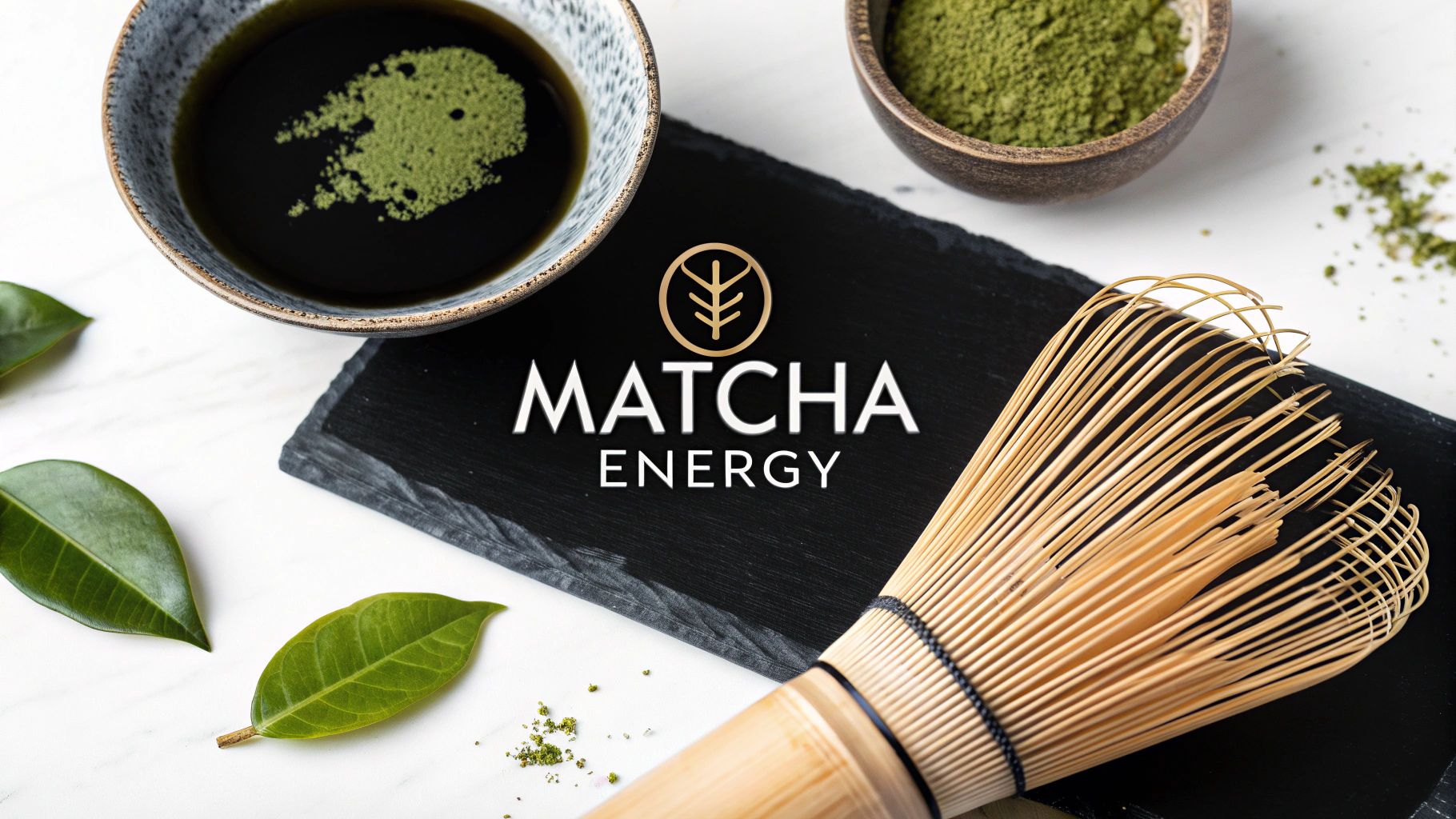
Looking for a natural boost? Discover how matcha for energy offers a clean, sustained lift. Find the best matcha to energize your routine!
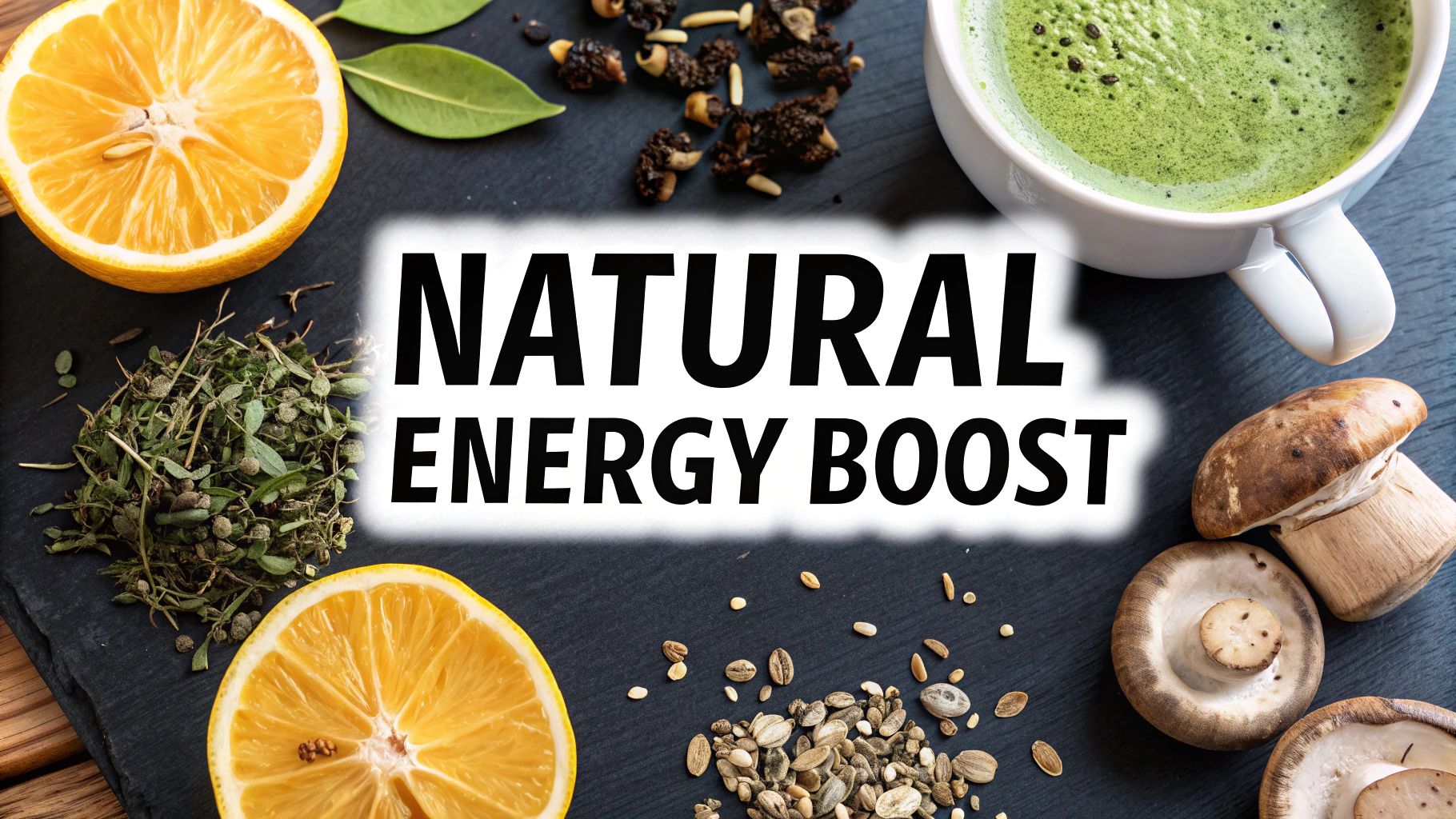
Tired of the crash? Discover healthy alternatives to energy drinks for sustained energy and focus. Your guide to natural vitality without the side effects.
